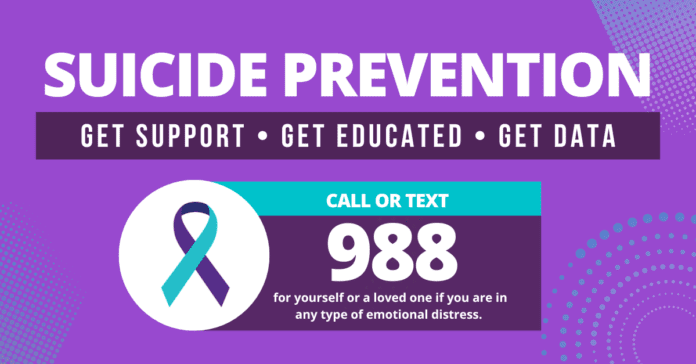By Dean Rudloff, member of the Lake County Mental Task Force and The North Shore Mental Health Group
There is no doubt that suicides happen. There is little doubt that each of us have knowledge of someone who died by suicide – a family member, a neighbor, a friend. Each year, September is a time set aside to call attention to a very significant fact that suicides are preventable, help is available, and recovery is possible.
We all have mental health and it’s as essential to a person’s life as physical health. Mental Health (https://www.samhsa.gov/mental-health ) includes our emotional, psychological, and social wellbeing. It affects how we think, feel, and act, and shapes how we handle stress, relate to others, and make choices.
It can be hard for individuals, families, organizations, and communities to talk about mental health. Not talking about mental health and suicide can increase the risk of people that are struggling and potentially decrease the likelihood that someone will seek help when they need it the most.
Too often, public messaging conveys negative narratives about mental health and suicide. These negative narratives stigmatize mental health and suicide, which can contribute to feelings of uncertainty, shame, and self-loathing that prevent someone from seeking help or put them at greater risk for harm. Instead, a narrative of hope and resilience can influence how people think, feel, and act. What we say to ourselves and others can encourage hope, celebrate life and help ourselves and others understand that help is available, suicide is preventable, and mental illnesses are treatable.
What follows are “prevention actions” you can take to promote your mental health:
- Starting the conversation around mental health doesn’t have to be heavy. It can be as simple as asking “what’s going on?” Seize the Awkward has tips and opening lines to help make starting the conversation easier. ( https://seizetheawkward.org/conversation/starting-the-conversation )
- We are less alone when we turn to each other. The Mental Health Coalition has tips for fostering connection and how to find people to connect through technology. (https://www.thementalhealthcoalition.org/belonging/ )
- Sometimes it is hard to know when you need to connect with someone to support you with your mental health. Learn more about when you may need to get support, check out the My Mental Health infographic from the National Institute of Mental Health. (https://www.nimh.nih.gov/health/publications/my-mental-health-do-i-need-help )
- Seek help during times of struggle with loneliness or isolation by reaching out to a family member, friend, counselor, health care provider. If you or you know someone who needs support now, call our region’s Crisis Lifeline at 844.772.4724 or call or text the National Crisis Line: 9-8- 8.
And please remember: you are not alone.




